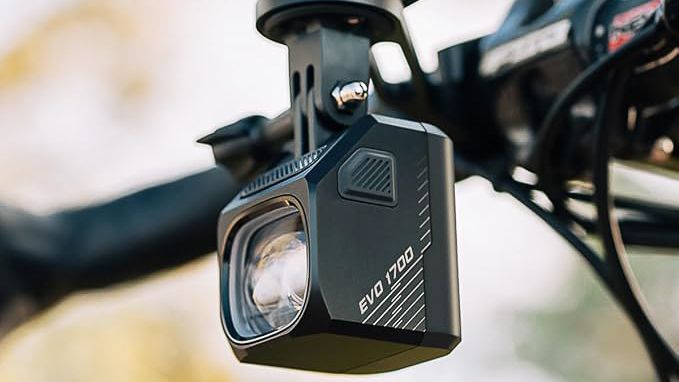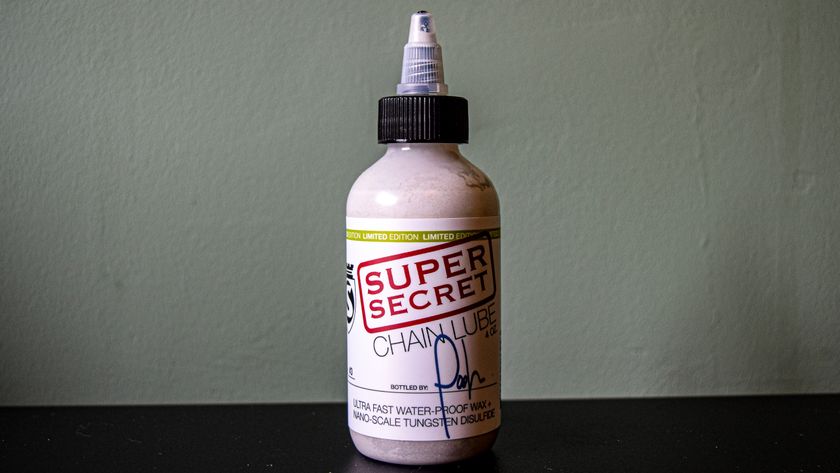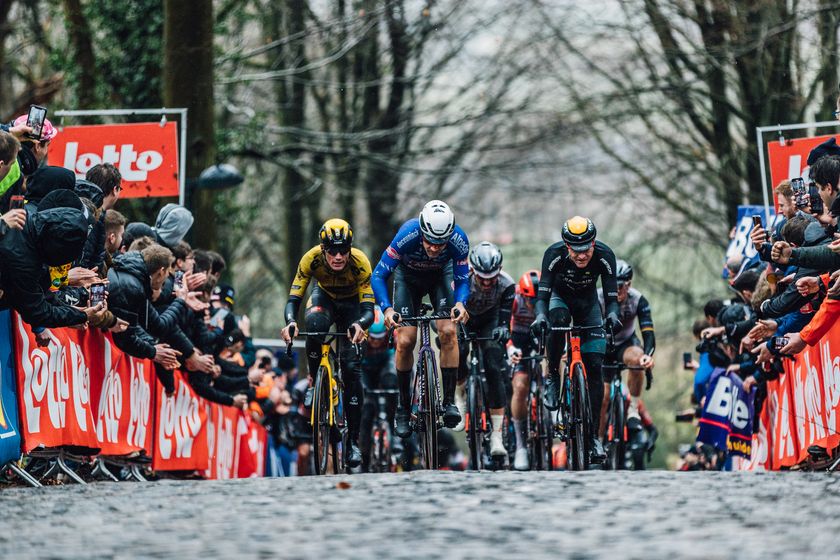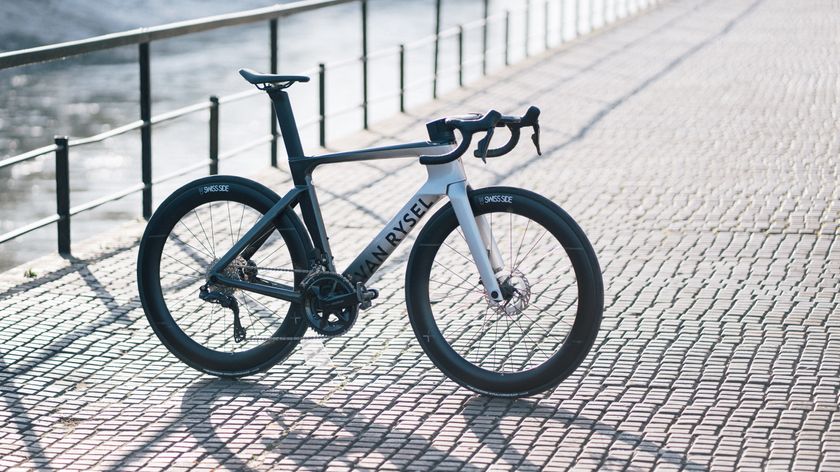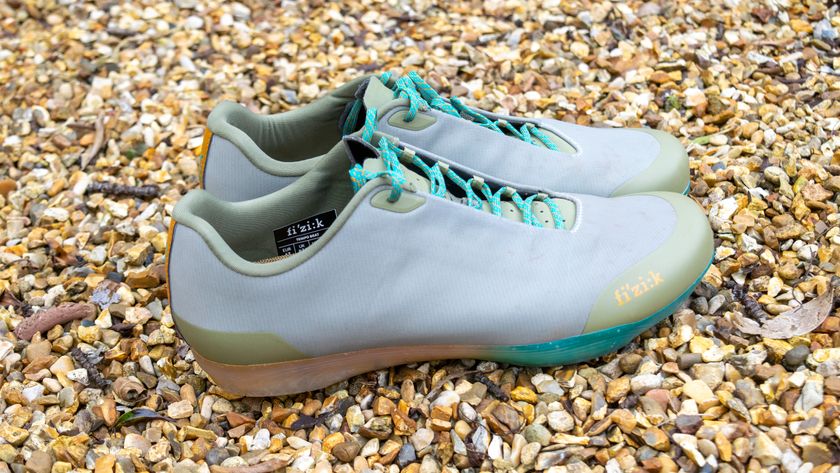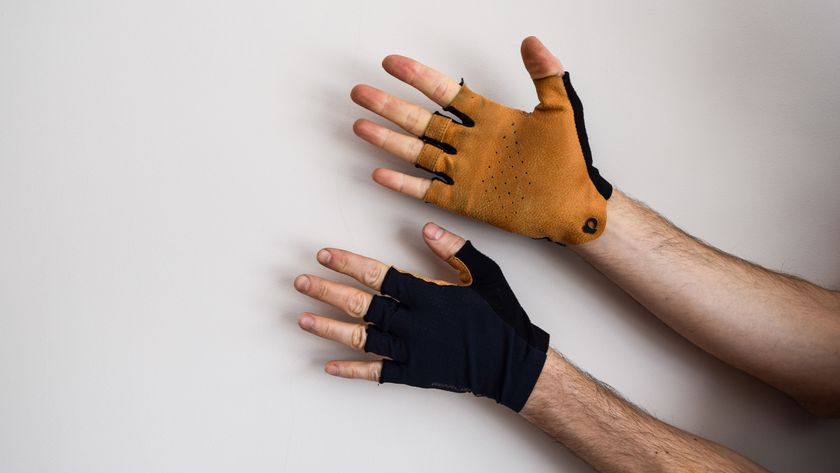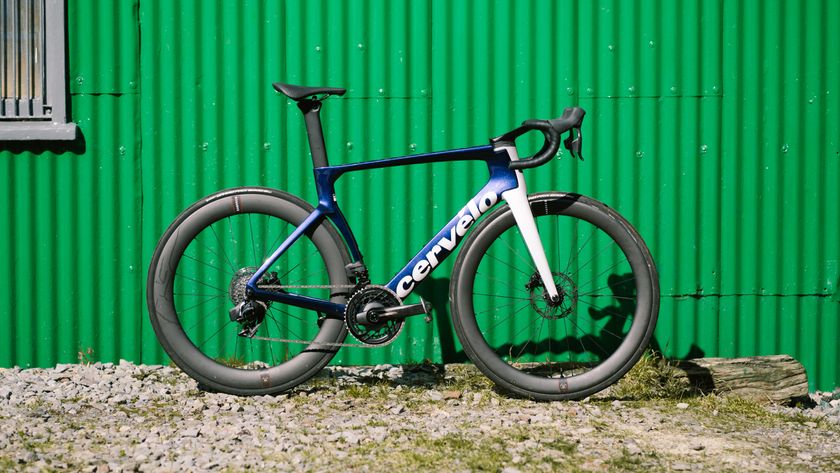You can trust Cyclingnews


















Last year we found Scott's flagship Addict CX RC to be chock full of raw speed and simply one of the highest performing 'cross racers around – however its ultra-premium US$7,474.99 price tag put it out of range of all but a few lucky souls and the trick parts kit perhaps wasn't always the most prudent choice for season-long durability.
A more rational alternative
Enter the standard Addict CX, which aside from the conventional telescoping seatpost versus the RC's integrated mast, uses the exact same frame but matched to a more affordable spec. Though still expensive at US$3,849.99, it's a far better value overall and offers a level of performance close enough to the RC that it's nearly impossible to justify the bigger brother's nearly two-fold price premium.
Actual frame weight on our small-sized Addict CX tester is an outstanding 1,080g (2.38lb) but just like on our old RC, that feathery weight is matched to superb overall stiffness akin to Scott's road-going cousin thanks to generous tube proportions and well-engineered fiber blends and lay-up schedules. Drivetrain response is among the best of any 'cross bike we've sampled and more in keeping with high-end road bikes – stomp on the pedals and you're rewarded with a quick burst of speed and zero mush or delay. Starts at the gun are impressively brisk, gaps close in a hurry, and there's a tangibly direct feeling of connectedness often lacking in softer chassis.
Handling is similarly precise as well, in spite of the fact that the Addict CX makes do with a standard non-tapered 1 1/8" front end. Credit goes to the big tube sizes again, of course, but equally impressive is the Ritchey Carbon Pro fork. Though a bit heavier than the RC's top-end WCS version (by just 45g according to Ritchey's specs), the legs are equally stout and the burly crown yields no brake shudder whatsoever even in technical, downhill corners.
The 70° head tube angle is notably slacker than most, however, and the Addict CX seems to prefer being aggressively thrown into corners than finessed through. It's more of a leaner than a turner and though we still found it to snake through chicanes adeptly enough, it does require a bit more conviction to do so than bikes with steeper angles. On the plus side, the bottom bracket height is barely taller than the road-going Addict so you can feel free to lean the CX awfully hard.
Again like its RC stablemate, the Addict CX is irrefutably stiff in torsion and down below but also vertically, too. The giant tube profiles up front and the beefy wishbone-style seat stays make the CX feel ultra-sharp and quick but the rough ride limits its versatility somewhat. Thrash it as hard as you dare for an hour while racing but longer jaunts will fatigue you quicker than softer rides. Lest you upgrade to low-pressure tubulars, the lack of compliance can also make for slightly skittish cornering in the rough.
All of the 'cross-specific details are well addressed. Mud clearance is generous at all corners and even though the chain stays are a bit close to the sidewalls, they're notably thin and leave almost no 'shelf' on which to build up muck. The semi-compact frame layout leaves plenty of room to pass your arm through for run-ups and the top tube's generous diameter – not to mention the thin tube walls – is surprisingly comfy resting on your shoulder.
And what about that cable routing? We initially balked at the unusual underside placement of the rear brake cable but the more we use it, the less it bothers us. It's offset enough to the side that the cable doesn't sit in between you and the bike, the forward cable stop never actually touches your shoulder and the clean upper top tube surface makes for a tad easier surface on which to rest your weight as you approach the barriers. Unusual, yes, but it does work.
Heavier but more sensible parts
Whereas the Addict CX RC comes with a SRAM Red transmission (including a light but mud-prone PowerDome cassette), an FSA SL-K carbon crank, and custom DT Swiss/Ritchey deep-section carbon tubular wheels, the standard CX carries forth with a far more affordable mix of Shimano Ultegra SL (not the newer Ultegra 6700 – not a bad thing in this case), FSA's hollow-forged aluminum Energy crankset and Mavic Ksyrium Elite clinchers.
All told there's a roughly 0.8kg (1.8lb) weight penalty but our complete test bike nevertheless comes out to an impressive 7.74kg (17.06lb) without pedals – still lighter than many dedicated road bikes we've sampled in the past.
The added mass – especially in the rolling stock – is noticeable in terms of general handling agility and violent accelerations as well as when picking the bike up for barriers and run-ups but for most users, the additional durability and everyday usability afforded by the changes will be welcome. The Ultegra SL's aluminum Dual Control levers are more tolerant of crashes than carbon fiber, the alloy crankarms more likely to shrug off being errantly bashed into barriers, and you're less apt to shed a tear when you inevitably puncture one of the Addict CX's clincher tires.
More importantly, the parts mix works flawlessly. We've said this multiple times but it's worth repeating anyway: save for a few extra grams, Shimano's Ultegra SL is wholly indistinguishable performance-wise from Dura-Ace 7800, faithfully rattling off shift after shift with understated precision and with rear shift smoothness that's still second to none. The FSA Energy crankset is fitted with 'cross-specific 36/46T rings that reliably move the chain back and forth without any drama, and the Mavic Ksyrium Elite wheels are closer than ever to the top-end models what with their newly milled-out aluminum rims – and though heavier than alloy, their stainless steel spokes are a wise choice for 'cross.
One hidden bonus is the TRP EuroX Carbon cantilevers. Scott includes these on the top-end RC model as well and while they can be more cumbersome to adjust than some, they're among the lightest brakes currently available (under 120g per wheel with toe-adjustable pads!), they offer excellent stopping power once set up properly, and they also come in a slick Scott-exclusive unidirectional finish – hard to complain here.
In fact, the only questionable piece of kit is the Selle Italia SLR saddle. We love its minimal shape and light weight on the road but its slim and hard profile isn't always the most welcome landing pad for remounts.
Tough to say no
Even with its faults it's just too hard to ignore the Addict CX's raw performance – simply put, it's one of the stiffest and lightest 'cross rigs out there and delivers a tangible increase in speed, something few bikes can claim.
Some readers will undoubtedly be disappointed that a bike in this price range doesn't already come with tubulars but we'd argue that most riders looking at something of this caliber probably already has a set of race wheels in the stable anyway. And consider this: as compared to the RC, one could buy a standard CX and a set of carbon tubular race wheels with tires that cuts the weight penalty by more than half – and still have money left over. Depending on exactly what you picked, you might even be able to get two sets – or pay for an entire season of racing – for the same amount of cash.
Still sounds expensive? You betcha. But this level of performance never comes cheap and at least in this case there's at least a modicum of value included.
Weight: 1,080g (bare frame size S w/ seat collar, derailleur hanger, bottle cage bolts); 465g (Ritchey Pro Carbon fork w/195mm steerer); 7.74kg (17.06lb) (complete bike as tested, without pedals).
Pros: Ultra-efficient and feather-light carbon frame, well chosen parts kit, versatile 'cross-specific gearing, still one of the fastest 'cross rigs around.
Cons: Stiff ride isn't the best for longer stints or rougher courses, slack head tube angle requires more conviction, still expensive for an Ultegra bike.
